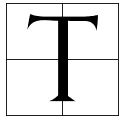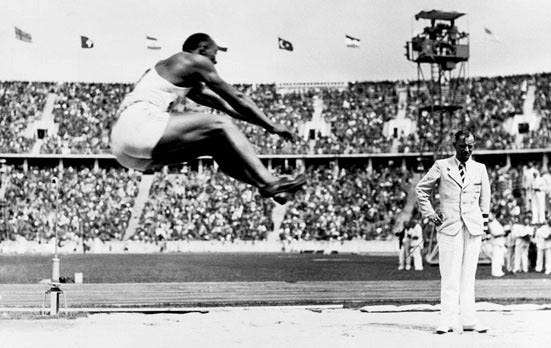 his is the story of a friendship born in the strangest of circumstances. African-American Jesse Owens and Luz Long, the German model athlete, clashed directly when Nazi Germany hosted the 1936 Olympics and to everyone’s surprise quickly became friends even if all nations expected a rivalry between them.
his is the story of a friendship born in the strangest of circumstances. African-American Jesse Owens and Luz Long, the German model athlete, clashed directly when Nazi Germany hosted the 1936 Olympics and to everyone’s surprise quickly became friends even if all nations expected a rivalry between them.
Sportsmanship above all
The gesture of the German athlete Carl Ludwig was a noble one. But it was a real scandal for the Nazi regime! In the long jump competition, the American athlete Jesse Owens won the gold medal after a jump of 8.06 meters. In front of Hitler, who was staying in the VIP lodge, Long approached his rival and congratulated him on his success. Owens would later say that:
“Hitler must have gone mad when he saw us hugging.”

The long jump duel took place on August 4, 1936, in front of 100,000 spectators. On one side was Long, the 23-year-old athlete who held the European record at the time. On the other hand, the 22-year-old African-American, is the holder of the world record. The competition between them is one of the best-known in the history of athletics. Out of their obsession with racial superiority, the Nazis called this competition the “Battle of Colors,” and Long’s mission was to demonstrate the superiority of the Aryan race to the world.
Friendship of Colors
In the decades following the 1936 Olympics, the story of the two athletes was built largely on Owens’ memories of the dramatic dispute. Even without all the Nazi propaganda around the test, the two pushed each other to perform as well as possible.
Moreover, they apparently became friends. As Owens writes in his 1970 autobiography, a key moment occurred during qualifying, when he had only one jump left, after a missed jump and one that was too short. Long then came to his aid, the American athlete remembers, and gave him some advice that helped him get through the test.
“See? Now how easy was that“, Long would have told Owens after he managed to qualify for the final. Then the two shook hands, and Owens answered with the only word in German he knew: “Danke.”
Owens nurtured the myth of his friendship with Long until his death in 1980. Although the two had never seen each other since, Owens claimed that he continued to receive emotional letters from Long, even after the outbreak of World War II. But there have always been doubts about the American athlete’s accounts.
Contesting this Friendship
Long’s son collected several documents about the life of his father, who became a soldier in the German army and was seriously wounded during a battle in Sicily in 1943. After his capture, he died three days later in a British military hospital. Five years after the end of the war, the German Red Cross discovered his tomb in central Sicily.
The collection of materials, not yet published, is entitled The Story of Luz Long — Athletes in the Third Reich. It is based on family documents, letters, notes, and diaries, as well as conversations with contemporary witnesses and excerpts from the diaries of the time.

But none of the material in the book provides evidence to support Owens’ claims about the beautiful friendship between him and Long. Nothing supports the existence of the alleged friendship that began in 1936 with Long’s altruistic advice, nor its continuation by correspondence in the years before the German’s death.
Given the information at the time, there is no doubt about Long’s gesture towards Owens immediately after the end of the famous duel or about the reprimands that were later addressed to him by Rudolf Hess. According to Long’s mother, Hitler’s deputy ordered her son to “never hug a black man again.”
Avid Writer with invaluable knowledge of Humanity!
Upcoming historian with over 30 million views online.
“You make your own life.”





